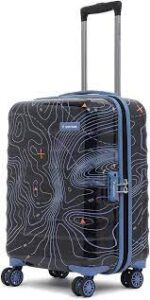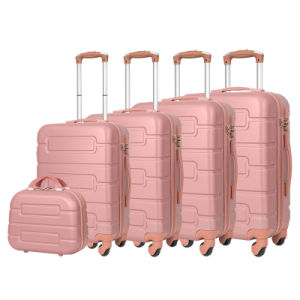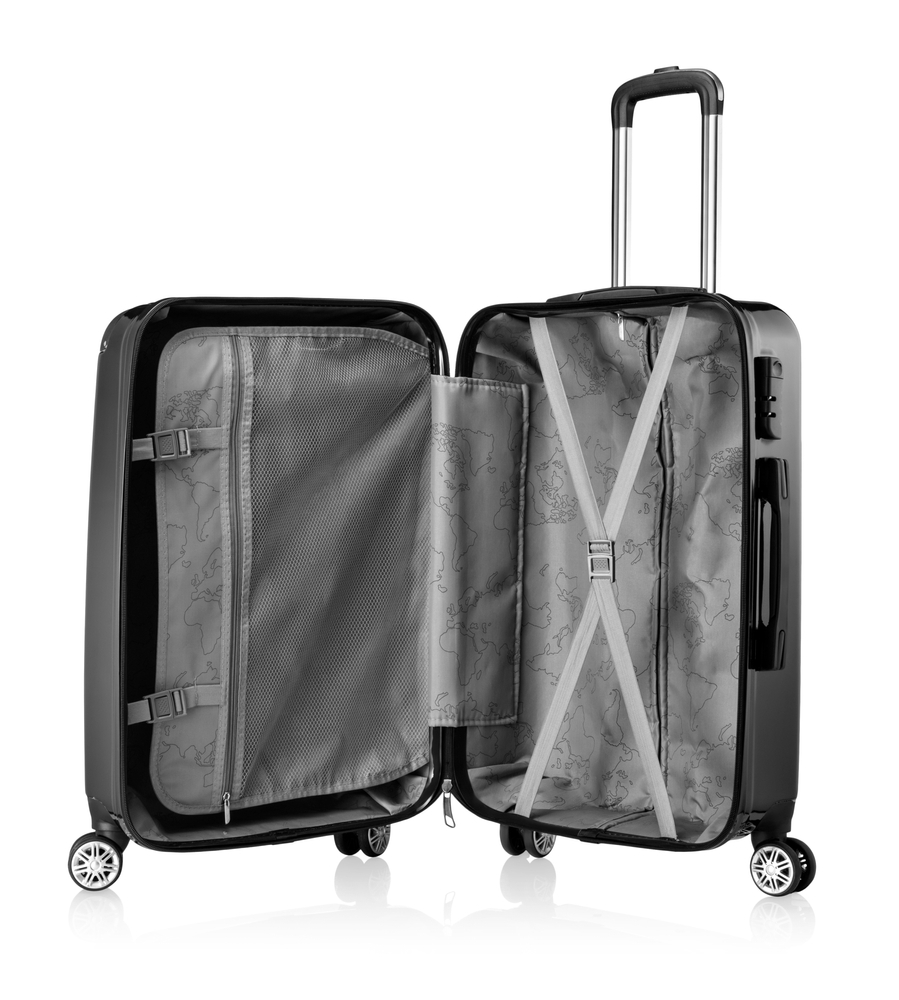ABS vs Polycarbonate Luggage
Whether you’re planning a weekend getaway, a business trip, or a globetrotting adventure, one essential decision lies at the heart of your journey: choosing the perfect luggage. And in the world of travel gear, two heavyweights often step into the ring – ABS vs Polycarbonate.
Picking the right luggage isn’t just about having something to carry your belongings; it’s about securing your stuff, withstanding the trials and tribulations of travel, and doing it all in style. In this in-depth exploration, we’ll unveil the nitty-gritty details of ABS vs Polycarbonate luggage, helping you make an informed decision for your upcoming escapades.
Buckle up as we navigate through durability, weight considerations, design and style, security features, climate resilience, and so much more. It’s not just about the materials; it’s about the journey. So, are you ready to embark on this adventure? Let’s dive in and find out which one is the ultimate travel companion!
Polycarbonate vs. ABS: A Comprehensive Comparison
Polycarbonate vs ABS. It’s like choosing between a trusty old friend and a promising newcomer. Let’s delve into this head-to-head battle of luggage materials and see which one emerges victorious for your travels.
Battle of the Titans
Imagine you’re standing at the luggage aisle, staring down at two contenders – one made of tough Polycarbonate and the other crafted from sturdy ABS. Both are flexing their durability muscles, tempting you with their sleek designs and promising to keep your belongings safe. But which one truly stands the test of the travel time?
Polycarbonate: The Lightweight Dynamo

Polycarbonate luggage, often hailed as the lightweight champ, is like the Olympic gymnast of the luggage world. It’s nimble, it’s quick, and it won’t weigh you down. Imagine effortlessly gliding through the airport, your luggage trailing behind you with the grace of a figure skater. Polycarbonate’s feather-light nature ensures you won’t start your trip with aching arms.
ABS: The Reliable Workhorse

Now, let’s talk about ABS – the reliable workhorse in this showdown. Sturdy and dependable, ABS luggage is the marathon runner of the travel game. It can take a beating and still stand strong, just like that enduring friendship that lasts a lifetime. With ABS by your side, you can toss your luggage into the trunk of a cab or onto a luggage carousel without a worry. It’s the tough nut that’s hard to crack.
Durability Comparison
Now, it’s time to tackle a critical aspect of the ABS vs. Polycarbonate showdown: durability. We all know travel can be a real test for your luggage. The bumps, jolts, and occasional rough handling are enough to make even the most seasoned traveler wince. So, the question is, which material can withstand this wear and tear and emerge unscathed?
Battle-Tested: Which Material Can Withstand More Wear and Tear?
Think about your luggage as a trusty shield, protecting your belongings on your globetrotting adventures. When it comes to toughness, ABS and Polycarbonate each have their unique qualities.
ABS luggage, with its rugged exterior, can take a hit like a champion boxer in the ring. Whether it’s a tumble down a flight of stairs, a rough carousel ride, or a stint under a pile of other suitcases, ABS stands its ground. It’s like that battle-hardened knight who always emerges victorious.
Polycarbonate, on the other hand, is like a nimble ninja. It might not be as sturdy as ABS, but it excels in flexibility. It can absorb impacts without cracking, making it a valuable ally in the constant war against wear and tear. It’s your silent guardian, ensuring your possessions remain unscathed.
Weight Considerations
When it comes to traveling, every ounce counts, and that’s where the weight of your luggage comes into play. Let’s delve into the weighty matter of ABS vs. Polycarbonate luggage and find out which material helps you pack smart and travel lighter.
Packing Smart: Analyzing Weight Differences
Imagine you’re at the check-in counter, and the airline agent is giving you that scrutinizing look. We’ve all been there. Airline baggage weight limits are strict, and exceeding them often means forking out extra cash. So, which luggage material should you choose to avoid those hefty fees?
Polycarbonate steps into the ring as the lightweight contender. It’s like that one friend who always manages to pack everything they need for a week-long trip in a carry-on. With Polycarbonate, you can sneak in that extra pair of shoes, your favorite books, and maybe even a souvenir or two, all without pushing your luggage over the weight limit.
Now, let’s talk about ABS. It might not be as light on its feet as Polycarbonate, but it has other tricks up its sleeve. While it’s a bit heavier, ABS compensates with its robustness. That means you can pack to your heart’s content, knowing that your luggage can handle it. It’s like having an overeager buffet-goer as your travel companion – pile on the dishes; it can take it.
Travel Lighter: Polycarbonate vs ABS Luggage Weight Analysis
So, you’re eyeing that Polycarbonate suitcase and wondering if it’s too good to be true, right? Can a lightweight material really withstand the rigors of travel? The answer is a resounding yes. Polycarbonate might be the featherweight champ, but it’s no pushover. Its flexibility allows it to absorb impacts without adding extra bulk.
ABS, while a bit heavier, offers a different kind of peace of mind. You don’t have to engage in a constant battle with the weight scale. With ABS luggage, you can toss in that extra sweater, your favorite snacks, and maybe even that travel-sized guitar without a second thought.
It’s all about balance – the delicate art of choosing between weight and toughness. Do you prefer the nimbleness of Polycarbonate, allowing you to pack more, or are you looking for the reliable brute strength of ABS to ensure your luggage survives the journey unscathed?
In the ABS vs. Polycarbonate luggage battle of the bulge, there’s no one-size-fits-all answer. It depends on your personal packing habits and how much you’re willing to lug around. In the end, both materials have their pros and cons, and the best choice is the one that complements your travel style. So, pack smart, travel lighter, and make your luggage work for you. Bon voyage!
Read – Travel More by Travelling Safe
Security Features
Traveling the world is a grand adventure, but it’s essential to keep your belongings safe and sound. In the world of luggage, security is paramount. So, let’s dive into the safety measures of Polycarbonate and ABS luggage and see which material locks down your peace of mind.
Safe Travels: Exploring the Security Features of Polycarbonate and ABS Luggage
Imagine you’re at the airport, about to embark on your dream vacation. As you hand over your luggage at check-in, a question lingers in your mind – “Are my belongings secure?” That’s where the security features of your luggage come into play.
Polycarbonate, with its lightweight and flexible nature, isn’t known for its security features. It’s more like that carefree spirit who loves the journey and doesn’t fret about the destination. While it may not have built-in locks or tamper-resistant zippers, you can always supplement its security with a trusty luggage lock.
Now, let’s talk about ABS. It’s the reliable guardian of your possessions. ABS luggage often comes equipped with built-in locks and enhanced security features, making it the sentry of the travel world. It’s like having a personal bodyguard for your belongings, ensuring they remain safe throughout your journey.
Lock It Down: Which Material Offers Better Security for Your Belongings?
Security is a top priority, especially when you’re carrying valuables or sensitive items in your luggage. ABS offers that extra layer of protection. Its durable build and integrated locking mechanisms help deter potential thieves. It’s like fortifying your castle with strong walls and a moat. Your possessions remain secure, and you can travel with peace of mind.
Polycarbonate, while not as security-focused out of the box, can still be a reliable travel companion. You have the option to add your preferred locks and security measures, ensuring your luggage is just as secure as its ABS counterpart. It’s like adding an alarm system to your home; the security is tailored to your needs.
In the battle of security, ABS comes off as the knight in shining armor, providing that peace of mind without the need for additional accessories. Polycarbonate, on the other hand, offers a lighter approach but still lets you take control of your luggage’s safety.
In the ABS vs. Polycarbonate luggage contest for security, it’s a matter of preferences. If you value built-in security features and convenience, ABS is your go-to. If you don’t mind taking some extra steps to secure your luggage and prefer the nimbleness of Polycarbonate, that’s a valid choice too. Secure your belongings, and let the adventures unfold worry-free.
Maintenance and Cleaning
Your trusty luggage has been with you through thick and thin, but it’s not immune to the wear and tear of travel. To keep it in tip-top shape, you need to know how to maintain and clean it. In this section, we’ll provide you with an easy maintenance guide for both Polycarbonate and ABS luggage, and share some valuable cleaning tips to ensure your travel companion stays in pristine condition.
Easy Maintenance Guide: ABS or Polycarbonate Luggage
So, you’re back from that epic adventure, and your luggage has seen better days. Fear not; with a little maintenance, you can have it ready for the next journey. When it comes to Polycarbonate luggage, it’s like having a low-maintenance pet – easy to care for.
Polycarbonate’s smooth and hard exterior is less prone to scratches and scuffs, which is a plus. To keep it looking fresh, all you need is a damp cloth and a gentle cleaning solution. Wipe down the surface to remove any dirt or stains, and voila, it’s good as new. No need for fancy cleaning products or elaborate rituals.
Now, let’s shift our focus to ABS luggage. Like a sturdy vehicle, ABS can take a hit and still stand strong. But it might accumulate some scratches along the way. No worries – a little bit of TLC will do the trick.
To clean ABS luggage, grab a soft cloth and a mild cleaning solution. Gently wipe away any dirt or scuffs. For those stubborn marks, a magic eraser works like a charm. ABS might be the tough guy, but a gentle touch keeps it looking pristine.
As you jet-set around the world, it’s essential to keep your belongings safe and sound. Your luggage is your partner in crime on these adventures, and in the world of travel, security is non-negotiable. Let’s dive into the nitty-gritty of Polycarbonate and ABS luggage security features and find out which one truly locks down your peace of mind.
Read – Luxury Shopping: Top Five Places to Drop Some Cash
Cleaning and Care: Keeping Your Luggage Looking Brand New
Maintaining your luggage isn’t just about the occasional wipe-down. It’s also about storing it properly. When your trusty travel companion is not in use, store it in a cool, dry place. Avoid keeping it in direct sunlight or damp areas.
Additionally, remember to remove any luggage tags, so they don’t leave marks on your suitcase. They might be like battle scars, but it’s always good to keep your luggage looking sharp.
In the ABS vs. Polycarbonate battle of maintenance and cleaning, both materials are relatively low-maintenance. Polycarbonate is like the low-maintenance roommate who keeps things tidy without any fuss. ABS is the easygoing friend who can take a little rough handling and still look good.
Your luggage is more than just a travel accessory; it’s a reflection of your journeys and adventures. With some straightforward maintenance and cleaning, you can ensure it stays in pristine condition and ready for the next escapade. So, pack smart, travel lighter, and make your luggage work for you. Happy travels!
Conclusion
As we’ve journeyed through the world of travel gear, we’ve unraveled the ongoing debate of ABS vs. Polycarbonate luggage. It’s a choice that many travelers grapple with, and after this thorough exploration, you’re now armed with the knowledge to make an informed decision.
In your travel adventures, your luggage is not just a carrier of clothes and gadgets. It’s your trusted companion, your silent witness to countless adventures, and your protector of cherished possessions. So, which material should you choose as your ideal travel buddy?
Whether you go for the nimbleness of Polycarbonate or the sturdiness of ABS, remember that your luggage is more than just a suitcase. It’s a part of your journey, your adventures, and your stories. So, make your choice wisely, and let your ideal travel companion accompany you on many memorable trips to come.
In the end, the choice between ABS and Polycarbonate luggage is as personal as your travel style. It depends on your unique needs, preferences, and budget. There’s no one-size-fits-all answer, but there’s certainly a perfect match for you.
Now, with your decision in hand, you’re ready to pack your bags, head to the next destination, and explore the world with your trusted travel partner. Bon voyage, dear traveler!
FAQs
Is ABS material good for luggage?
ABS material is a common choice for luggage. It’s known for its durability and affordability. It can withstand impacts and rough handling, making it a good option for travelers who want luggage that can last through frequent use. However, whether it’s “good” for your specific needs depends on your preferences and priorities.
Which material is best for luggage bags?
There’s no one-size-fits-all answer to this question. The best material for luggage bags depends on your travel style and priorities. Factors to consider include durability, weight, security features, and cost. Common materials for luggage bags include ABS, polycarbonate, aluminum, and polypropylene.
Which is better ABS vs polypropylene luggage?
Both ABS and polypropylene are used for luggage and have their own advantages. ABS is known for its durability and affordability, while polypropylene is lightweight and impact-resistant. The choice between the two depends on your specific requirements and preferences.
Does polycarbonate luggage crack easily?
Polycarbonate luggage is known for its impact resistance and durability. While it can withstand impacts better than ABS, extreme force can still cause damage, including cracking. However, it’s generally more durable and less prone to cracking compared to some other materials.
What are the cons of ABS material?
Some cons of ABS material include its weight (it can be heavier compared to other materials), susceptibility to scratches and scuffs, and being less flexible compared to materials like polycarbonate.
What is ABS luggage?
ABS luggage refers to luggage that is primarily made from Acrylonitrile Butadiene Styrene (ABS) plastic material. ABS is a common thermoplastic polymer used in various applications, including luggage manufacturing. ABS luggage is known for its durability, security features, and affordability, making it a popular choice for travelers.





No Comments